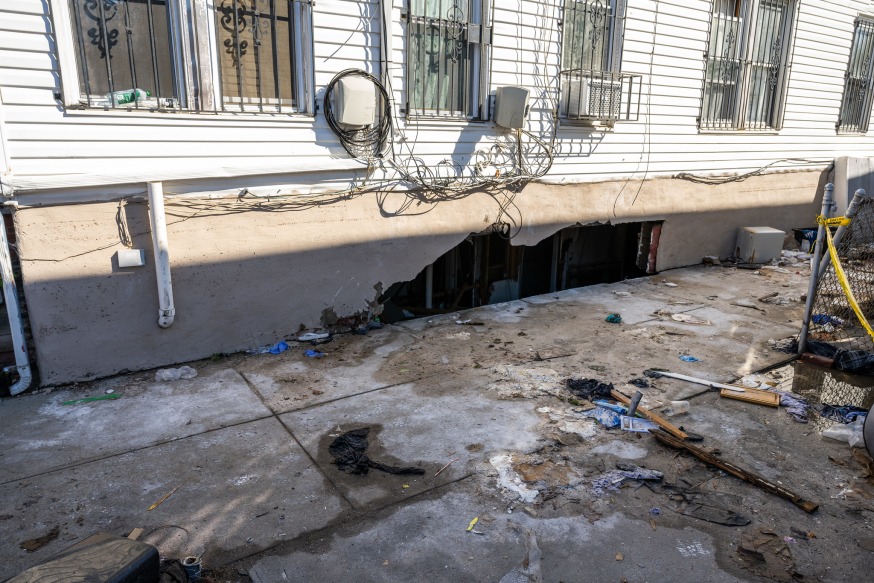
The basement apartment in Jamaica where a 43-year-old woman and her 22-year-old son died due to flooding Wednesday night (Darren McGee/ Office of Governor Kathy Hochul)
Sept. 3, 2021 By Allie Griffin
The city will mandate evacuations of basement apartments ahead of future storms after nearly a dozen people drowned in such homes Wednesday.
The city will send teams door-to-door to help evacuate New Yorkers living in basements in order to prevent loss of life in future storms, Mayor Bill de Blasio announced Friday.
His announcement came two days after the remnants of Hurricane Ida poured record-shattering rainfall on the five boroughs.
The storm took the lives of 13 New York City residents — most of them in basement apartments. Queens suffered the greatest loss of life at 11 people.
Ten of the 11 people who died in Queens drowned in their basement-level homes as rainwater rushed through their front doors — blocking what is often the only exit in such units.
In many cases, the basement apartments filled with water from floor to ceiling in a matter of minutes, turning the homes into death traps before residents could escape.
Queens has a large concentration of basement apartments that are often illegal and are therefore difficult to track — though the citywide number is expected to be in the tens of thousands, according to the New York Times.
Many immigrant and low-income New Yorkers turn to the subterranean apartments as the only affordable option in the city’s limited and increasingly expensive housing stock.
The landlords of the basement units are also often immigrants and/or lower-income New Yorkers themselves. They convert the basements of their homes into rental property for extra income.
The majority of basement apartments across the city are illegal and not up to code — and often dangerous in the case of fires too as most only have one means of egress.
De Blasio said the city will focus on such units in forthcoming storm events to prevent the same tragic loss of life the city experienced Wednesday.
He said the city would expand flood evacuation zones from coastal areas to include below-ground apartments as storms like Ida increasingly have greater and faster rainfall. Ida brought the greatest single-hour rainfall — 3.15 inches — in the city’s history Wednesday, breaking a record set less than two weeks earlier.
“The worst tragedies we saw on Wednesday did not happen anywhere near the shoreline…,” de Blasio said. “Now we understand that there needs to be a different kind of evacuation for folks in basement apartments.”
The city will issue evacuation alerts via text message to targeted neighborhoods where basement apartments are common and send emergency responders door-to-door to evacuate residents.
“This is a very forceful measure,” de Blasio said. “It’s not just saying to people you have to get out of your apartment, it’s going door-to-door with our first responders and other city agencies to get people out.”
Even if a resident is living in an illegal unit or is undocumented, de Blasio said they should never hesitate to call for help in an emergency.
“Anyone in a basement apartment, if you’re in any danger at all, call 911 and never wonder if your documentation status will be asked — it will not be,” he said. “Never wonder if there will be any threat to the place you live in if you call because you’re in danger.”
Many housing activists and elected officials have called on the city to legalize basement apartments to expand the city’s affordable housing stock.
The storm’s fatalities, however, renewed scrutiny over the dangers of converting basements into apartments.
Still, advocates said legalization of such units could help bring the them up to code, make them safer and create a way for the city to track them.
The city recently launched a pilot program in East New York to help homeowners convert their basements into safe, legal apartments by providing them with low or no-interest loans to bring the units up to code. However, the pilot has been hindered by pandemic budget cuts.






